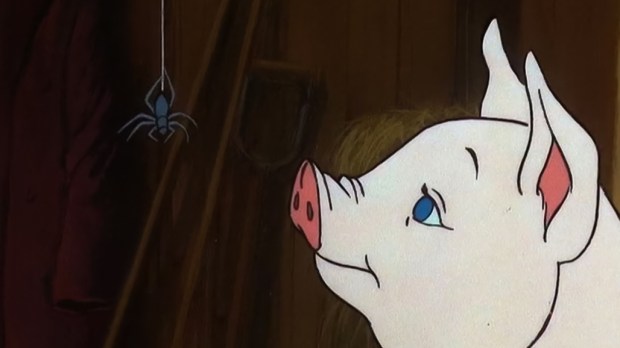My 7-year-old wandered into my home office looking downcast. As he silently started browsing the shelves for a book, I realized he must have just finished Charlotte’s Web, which he’d been poring over for a day or two.
I was probably my son’s age the last time I read Charlotte’s Web, so my only recollection of it was that it was really sad at the end, and it had something to do with a spider. When my son picked it up he quickly lost himself in the story.
Now as he ran his eyes along my shelves, I asked him how he’d liked the book and if it was sad. He nodded and kept browsing, so I pressed him. “Honey, tell me about the story. I can’t remember it anymore. Was it sad?”
Without answering he suddenly rushed out of my office, banging the door behind him.
I started after him, wondering at his reaction — but as I opened the door, I found him standing just outside of it, crying.
“I don’t want to talk about it, Mom,” he said with big sobs.
He’s my oldest child and this was the first time he’d experienced such a strong wave of emotion from a work of fiction. I recognized it as a new milestone, yet another “first” from which I must somehow pull a tidy life-lesson to help form his character.
So, like any good mother, I wrapped him up in my arms and cooed consoling words, and immediately gave in to self-doubt: Why in the heck do we read sad stories anyway, I wondered, recalling that Charlotte’s Web had been a schoolbook for me. He’s a kid and I’m busy protecting him from so much of life’s sadness, and then I give him this?
My son only tolerated my hugs for a few minutes — there’s only so much consoling a 7-year-old boy will take — and then he ran off to distract himself with other things. But I turned back to my desk still questioning. I shot off a quick note to a friend I can always count on for insights.
She quickly replied, a bit amused but understanding both my desire to help my son, and my self-doubt.
“Remember that your role is not to save him from suffering, but to help him find happiness,” she started off, recalling that there’s no escaping suffering anyway, since it’s part of the human experience, and — contrary to what our culture tells us — it’s not the obstacle to happiness. Remember how many stories we read of people who deeply suffer, she pointed out, but are also deeply happy.
“Suffering can help us see the humanity in others, and from what you’ve told me, part of your ongoing effort with [your son] is to help him empathize, to learn how to see the other person as another person, like him, who also has an inner world and feelings, so that he learns to be more sensitive and considerate when interacting with them.”
“And by the way,” she continued, “this is a purpose of fiction — to bring you into a story to teach you a lesson, because the human person learns more by story than by any other form of instruction.”
She put it into context by referencing a class she’d taken in moral theology: “When the story is transmitting proper moral values, it can be a powerful form of education; it can be equally powerful if not transmitting sound values, and hence the great damage done by modern entertainment. Many agendas have entered our country through TV, and only then have made their way into the classroom or the government. Our hearts are moved by stories, and the heart is the core of the person, the center of his decisions.”
And so there was a point to it all, she assured me. It’s true that Charlotte’s Web had made my son cry — had even made him “suffer.” But that strong emotional reaction was designed to turn his heart toward the values the story conveyed: concern for our neighbor, friendship, loving to the point of sacrifice, etc.
So I guess it won’t be the last time I encourage him to read a good book, even if it’s sad at the end. But it does make my mother’s heart ache to know all the learning still before him.

